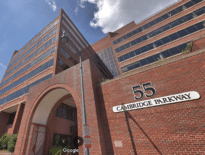
Dorchester Lower Mills, on the Boston-Milton line and next to areas Milton officials rezoned this month to comply with the MBTA Communities law. iStock photo
The Milton Planning Board struggled to answer a delicate question Thursday night – what should elected town officials do when voters reject a zoning plan that throws the municipality into noncompliance with a state law and prompts state officials to withhold grants and threaten a lawsuit?
The five-member board started with the Feb. 14 vote, where a whopping 45 percent of the town’s registered voters went to the polls and voted 54-46 percent to reject a zoning plan developed by town officials and approved at Town Meeting to comply with the pro-housing MBTA Communities law.
Most members of the Planning Board said they had to respect the will of the voters, but there was some disagreement about what exactly the voters were saying.
Meredith Hall, the chair of the Planning Board, said she had two takeaways. The first was that voters on the eastern side of town, where turnout was enormous and heavily opposed to the zoning plan, felt the zoning plan had the potential to overburden their neighborhoods with multi-family housing.
The second takeaway was that state officials had misclassified Milton as a rapid transit community, given that the town has an ancient trolley that could hardly be classified as rapid as it travels from Ashmont Station in Dorchester through Milton to Mattapan Square.
The designation as a rapid transit community meant Milton had to develop its zoning plan faster than most other communities and had to zone for a potential capacity (far fewer would ever get built) of 2,461 housing units, or 25 percent of the current housing stock. Being classified as a community adjacent to transit would require a zoning capacity equal to just 10 percent of the current housing stock.
Three other members of the Planning Board indicated they agreed with Hall that Milton had been misclassified as a rapid transit community. Board member Sean Fahy said he viewed the town vote as a mandate to push for reclassification and then develop a new zoning plan. (To see why the state disagrees, read this letter.)
Board member Cheryl Tougias, who has supported the voter-rejected zoning plan, said the only thing the board knows for sure is there were more “no” votes on the zoning plan than “yes” votes. “We shouldn’t assume we know why people voted no. And we shouldn’t assume we know why people voted yes,” she said. “We shouldn’t assume everyone supports reclassification.”
She called for a public engagement process to learn what voters were thinking when they cast their votes, but Fahy suggested that would be a waste of time.
“The people who voted no were opposed to it,” he said. “The group that voted yes is comprised of a number of different groups of people. There are some people who are completely on board with 25 percent. There are people that voted yes because they felt threatened. They felt threatened by the rhetoric of the state and threatened by this notion of this loss of funding.”
Tougias asked how Fahy knew what voters were thinking. “Have you not heard that yes voters voted out of fear?” Fahy responded.
The Planning Board is slated to meet in executive session on Monday with the Milton Select Board to start crafting a plan for moving forward. Hall indicated she wanted to go into that meeting with some sort of plan, but no firm consensus was reached at Thursday night’s meeting.
“Our residents would like to really see us work with the state and come into compliance,” Hall said.
Time may be running short for an amicable resolution. Most Planning Board members said it would take time to draft a new zoning plan and felt it would be impossible to win approval for it at Town Meeting before the fall.
Reclassification would require a policy reversal by the Healey administration or passage of legislation exempting the trolley from the definition of rapid transit.
Milton missed the deadline for submitting its zoning plan to the state but was granted an extension because of the town vote on the proposal. Now that the zoning plan has been rejected by voters, pressure is building at the state level to bring Milton into line quickly to send a message to other communities who might be considering similar type action.
The Healey administration is already withholding grant funds from Milton and Attorney General Andrea Campbell is considering a lawsuit against the town.
One resident of Milton joined the Planning Board’s Zoom meeting and urged the town to get out front on the issue and sue the state first on the grounds that it had been misclassified as a rapid transit community. Put the issue in the hands of a judge, the resident said, adding that it would be naïve to think state and Milton officials could get together and come to an understanding.
“It’s not going to happen,” he said. “There’s too much political capital involved. There’s too many other towns that are looking to see what happens here. And frankly, in a battle of resources, we’re at a disadvantage.”
This article first appeared on CommonWealth Beacon and is republished here under a Creative Commons license.![]()






